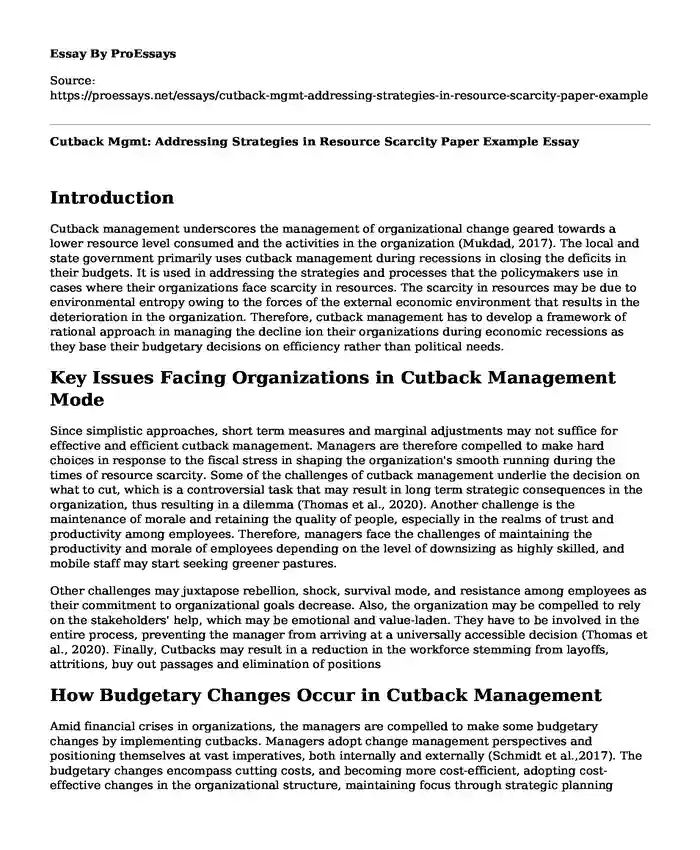Introduction
Cutback management underscores the management of organizational change geared towards a lower resource level consumed and the activities in the organization (Mukdad, 2017). The local and state government primarily uses cutback management during recessions in closing the deficits in their budgets. It is used in addressing the strategies and processes that the policymakers use in cases where their organizations face scarcity in resources. The scarcity in resources may be due to environmental entropy owing to the forces of the external economic environment that results in the deterioration in the organization. Therefore, cutback management has to develop a framework of rational approach in managing the decline ion their organizations during economic recessions as they base their budgetary decisions on efficiency rather than political needs.
Key Issues Facing Organizations in Cutback Management Mode
Since simplistic approaches, short term measures and marginal adjustments may not suffice for effective and efficient cutback management. Managers are therefore compelled to make hard choices in response to the fiscal stress in shaping the organization's smooth running during the times of resource scarcity. Some of the challenges of cutback management underlie the decision on what to cut, which is a controversial task that may result in long term strategic consequences in the organization, thus resulting in a dilemma (Thomas et al., 2020). Another challenge is the maintenance of morale and retaining the quality of people, especially in the realms of trust and productivity among employees. Therefore, managers face the challenges of maintaining the productivity and morale of employees depending on the level of downsizing as highly skilled, and mobile staff may start seeking greener pastures.
Other challenges may juxtapose rebellion, shock, survival mode, and resistance among employees as their commitment to organizational goals decrease. Also, the organization may be compelled to rely on the stakeholders' help, which may be emotional and value-laden. They have to be involved in the entire process, preventing the manager from arriving at a universally accessible decision (Thomas et al., 2020). Finally, Cutbacks may result in a reduction in the workforce stemming from layoffs, attritions, buy out passages and elimination of positions
How Budgetary Changes Occur in Cutback Management
Amid financial crises in organizations, the managers are compelled to make some budgetary changes by implementing cutbacks. Managers adopt change management perspectives and positioning themselves at vast imperatives, both internally and externally (Schmidt et al.,2017). The budgetary changes encompass cutting costs, and becoming more cost-efficient, adopting cost-effective changes in the organizational structure, maintaining focus through strategic planning downsizing, and minimizing of budget to shape the organization.
Best Management Practices for Cutback Management
Downsizing should be viewed as an improvement and innovative opportunity instead of a threat and analyzing it in a positive tone that adoptive a defensive tone. Also, there should be the establishment of diverse revenue resources like utilities that may prove fruitful in surviving financial crises. Besides, the human resource in the organization should be viewed as an asset rather than an item in the budget line (Schmidt et al., 2017). Moreover, there should be decentralized decision-making involving of primary stakeholders in the maintenance of excellent communication, adopt understanding g and compassion and support for those who stay in the organization, and those who leave. Finally, there should be large cost-cutting measures like benchmarking and improvement processes to identify opportunities and maintain focus through strategic planning.
Differences Between Ordinary Change Management and Cutback Management
Ordinary change management underscores the support of employees who have been impacted by changes during transitions from their current states to future states. Change management is essential since organizational change may impact on people’s jobs and influence how they execute their documented process, how they access their new in the targeted database and how the new products would impact on their jobs. Ordinary change management is often reactionary and depicted in a linear process top present checkpoints, addressing items like organizational restructuring and implementation of new systems (Schmidt et al.,2017). On the other hand, cutback management underlies change in the organizational processes aimed at reducing the level of consumed resources whenever organizations face scarcity in resources (Mukdad, 2017). Cutback management may encompass vast organizational stakeholders' communication and management and may involve layoffs, downsizing g, and adopting cost-effective changes.
References
Mukdad, I. (2017). Cutback Management Decisions. Journal of Management and Policy.9(1): pp53-58. https://aurak.ac.ae/publications/Cutback-Management-Decisions.pdf
Schmidt, E., Groeneveld, S., & Walle, S. (2017). A change management perspective on publicsector cutback management: towards a framework of analysis. Public ManagementReview.19(10) pp.1538-1555.https://www.tandfonline.com/doi/full/10.1080/14719037.2017.1296488
Thomas, E., Pierce, J., & Tomes, W. (2020). The challenges of cutback management. IpsprPublication. http://www.ipspr.sc.edu/publication/Cutback.pdf
Cite this page
Cutback Mgmt: Addressing Strategies in Resource Scarcity Paper Example. (2023, Nov 05). Retrieved from https://proessays.net/essays/cutback-mgmt-addressing-strategies-in-resource-scarcity-paper-example
If you are the original author of this essay and no longer wish to have it published on the ProEssays website, please click below to request its removal:
- Communication in Organizations Paper Example
- New Zealand Banker's Association (NZBA) Paper Example
- New Product Development at Innocent Paper Example
- Essential SQL Tutorial for Technology & Data Management - Research Paper
- Essay Example on Agriculture: Key to Turkey's Food Security and Economic Stability
- Paper Example on Workplace Violence: Crisis Intervention for Optimal Biospychosocial Functioning
- Essay Example on Effectively Harnessing Team Collaboration for IT Management







